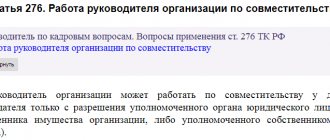Types of employment agreement
The employment contract depends on its duration and nature of work:
- An arrangement of indefinite duration.
- An arrangement with a specified duration (up to five years). Subjects of the federation may establish a different period.
Contracts are mainly concluded for an indefinite period. Concluding a fixed-term contract involves taking into account the nature of the work and its conditions.
The fixed-term agreement provides for temporary, seasonal work. Labor obligations are formalized in the form of an agreement between the parties. If, when establishing an employment relationship, the duration of its validity is not indicated, it is considered accepted for an indefinite period.
If the parties do not require to terminate such an agreement when its term has expired, the prerequisites for the urgency of the contract become invalid, and the employee continues to work under the contract for an indefinite period.
One type of employment contract is a contract. Its peculiarity is the existence of special regulations that regulate certain types of public service that are not regulated by labor laws.
How to profitably quit your job by agreement of the parties
When dismissing by agreement of the parties, you can specify any conditions and deadlines for termination of work.
What can you ask in exchange for your consent to resign? The law does not limit you in anything; the specific result depends only on your ability to negotiate.
Among the advantages of dismissal by agreement of the parties:
- There is no need to work the required 2 weeks; you can quit in one day if the employer does not mind.
- It is possible to ask for references or a cover letter.
- You can receive a substantial severance pay in an amount that suits both you and the employer.
- Absolutely any employee can terminate an employment contract: a pregnant woman on maternity leave, a single parent, a pensioner and all those who cannot be fired at the initiative of the company, but want to do it as profitably as possible.
The disadvantages of termination include the impossibility of reinstatement at work. In other cases, there is a chance to challenge the termination of the employment contract in court. A legally correct document will not allow you to be reinstated at work. There is only one exception when a woman, after her dismissal, by agreement of the parties, finds out about her pregnancy. Then a lawyer can assist in reinstating her to her position.
On the last day of work, the employee is given:
- full salary accrued for time worked;
- due bonuses;
- severance pay, if specified in the order;
- compensation for unfulfilled vacation.
Payment upon dismissal is calculated in accordance with Article 140 of the Labor Code of the Russian Federation. Additional amounts, including severance pay, may be transferred at other times. An agreement document will help guarantee their receipt; it is necessary to indicate the amount and date of payment.
For commercial organizations, the law does not limit the amount of payment upon dismissal; the amount can be absolutely any. For budgetary organizations, compensation should not exceed 3 months of the average monthly wage of the dismissed employee, in the Far North up to 6 times.
Fixed-term employment contract
Fixed-term contracts are divided into certain types:
- a precisely designated period of work (for example, when performing an elective position);
- relatively designated time (performance of specific work);
- conditional fixed-term contract (to replace an absent employee);
Working conditions determine the conclusion of a labor agreement:
- with normal conditions;
- with dangerous and unhealthy conditions;
- at night time;
- under special climatic conditions;
Termination of labor obligations at the initiative of the employee
This type of contract can be terminated early in accordance with the employee’s initiative due to the employee’s illness or disability, which does not allow him to perform work in accordance with the concluded agreement.
Obligations are terminated if the owner violates labor legislation or the requirements of the collective agreement.
To resolve disputes about premature termination of an agreement, one must turn to the general rules that are provided for resolving such disputes.
By concluding a fixed-term contract, a person undertakes additional obligations, namely:
- carrying out work with a set duration;
- performing a specific type of activity;
Labor legislation regulates other types of employment agreements with a fixed term:
- during the absence of a permanent employee to perform his functional duties;
- temporary (2 months) and seasonal types of work;
- when sent to work abroad;
- provision of various services (repair, installation and others for up to one year);
- referral for vocational training, work practice;
- activities in elective office;
- alternative service.
A fixed-term employment contract is also concluded:
- with representatives of small businesses;
- with pensioners by age;
- with people who work in the regions of the Far North;
- with representatives of creative professions;
- with persons taking part in sea and inland navigation;
- with persons taking part in the liquidation of an accident, catastrophe, epidemic and other exceptional situations.
Dismissal due to reduction
to reduce the number of employees at any time. The reason may be economic instability of the organization, optimization of production processes. At the same time, the employer is not obliged to voice the reason for his decision either to the employees or to the trade union. The employee receives written notice at least 2 months before the position is abolished.
Even in such a situation with dismissal due to reduction, you can find advantages. For example, it is quite possible to find a new job in 2 months. If this fails within 3 months after resignation, the employee can receive funds from the former employer. In total, according to standard rules, he will receive the following payments upon dismissal:
- the salary you worked;
- compensation for missed vacation;
- severance pay equal to the average monthly salary, with the exception of part-time workers, seasonal workers, and conscripts with contracts concluded for up to 2 months.
This money is transferred on the last day of work. Subsequent compensation is possible if the former employee was unable to find a job. Dismissal due to reduction is advantageous in that the employee can count on multiple payments upon dismissal. But, he must register with the employment center, receiving the status of an official unemployed. Maintaining this status confirms that the job has not yet been found. An employer can check whether a former employee is employed by looking at the work record book.
The first compensation is transferred immediately upon resignation. The second is paid after 2 months. The last one is three months after leaving, if a job is still not found. Thus, you can get 3 average monthly earnings. You can apply for compensation within 15 working days following the “unemployed month”.
*Note! When reducing staff, the employer often asks you to write a letter of resignation of your own free will. Under no circumstances should you sign it. By doing this, you will deprive yourself of the right to payment upon dismissal. If during the course of your work you received training at the expense of your employer, he will be able to recover this amount.
If the employer insists, you can persuade him to agree to an agreement between the parties with compensation beneficial to you.
An employer is intimidating: what to do?
Do not fall for provocations, do not sign documents. Do not believe that with the entry “dismissed by agreement” or “downsizing” they are not hired. This is a good entry and does not characterize the quality of the work duties performed.
You should not record an unpleasant conversation with your boss, it will not be accepted as evidence, or try to team up with other employees. No one will want to risk their position by standing up for you, even if you have good friendly relations. The only correct solution is to contact the prosecutor's office. This must be done while you are an employee. After leaving, the chances of restoring justice are extremely small.
Grounds for termination of an employment contract
Labor obligations are terminated by agreement of the parties, where it is important to agree on the time. They are terminated in the following situations:
- End of time for fixed-term agreement. The owner warns the employee in writing (the employee signs the order). Otherwise, fixed-term employment obligations become a contract with an indefinite duration.
- Termination of the contract at the initiative of the employee. He must write a letter of resignation giving 14 days notice.
- In case of seasonal work, the employer must be notified three days in advance. An employee has the right to withdraw his application, except in situations where a job has been offered to another employee in writing.
The legislation provides for certain circumstances for termination of a fixed-term agreement:
- illness or disability that prevents you from performing work according to your obligations;
- violation by the owner of labor legislation or the terms of an agreement (collective or labor);
- other valid reasons established by regulations.
The law does not provide for the issue regarding the time of notification by the administration. The contract is terminated at the moment indicated by the employee in his application.
He should not stop working if there is no permission from the head of the organization , because this is considered a case of non-compliance with internal regulations.
If the owner refuses to satisfy the employee’s request to terminate the contract on the grounds specified in labor legislation, the issue may be considered by a commission for resolving labor disputes. Workers have the right to appeal to the courts. The agreement is considered terminated after the court decision enters into force or the deadline specified therein occurs. Full payment is made to the employee.
Compensation upon dismissal
Formalizing a working relationship between an organization and a citizen by concluding a fixed-term contract does not relieve the manager from the obligation to provide basic guarantees to the employee. In particular, this applies to annual paid leave. Accordingly, if at the time of termination a citizen has unused rest days, then he is paid the appropriate monetary compensation:
- If the validity period does not exceed two months, then for every thirty days worked the employee receives two days of rest.
- A similar rule applies to a contract for seasonal work - two days of vacation for each month worked.
In other situations, the calculation of earned days of rest is carried out in the standard manner - 2.33 days of rest for each month worked. The accrual algorithm may vary depending on various specific conditions of a particular situation.
Termination of obligations at the initiative of the owner
Similar situations arise in the following cases:
- Termination of the enterprise's activities. Dismissed people must be paid benefits in the amount of the average monthly salary. It is stored for two months.
- Staff reductions at the enterprise. Workers with long experience and high professionalism and other advantages have an advantage. Coordination is being carried out with the trade union committee of the organization.
- Inconsistency with the position performed as a result of low qualifications.
- Repeated violation by an employee of the internal regulations of the enterprise.
Important Additions
- On the last day of work, you must pick up your work book if it is kept on paper. There is an option to send it by mail. For example, the head office and the actual place of work are located in different cities. The employee must give written consent to send the book by mail.
- We recommend that you independently or with the help of a third-party specialist check the correctness of the calculation of payment upon dismissal. It must be made for the actual days worked. The rate at which you worked is used for calculations. Among the deductions, only an advance payment is allowed if it was issued. No taxes or social contributions should be withheld.
- If severance payments are delayed, this must be compensated. According to the law, demand 1/150 of the Central Bank rate for each day of delay.
- Demand compensation for sick leave if you fall ill within 30 days after termination of the contract. Moreover, the need to pay sick leave does not depend on the reason for stopping work. Any former worker who is dismissed due to layoff, or in another way, and even those who were expelled for a disciplinary offense have the right to count on benefits.
- Sickness benefits are calculated at 60% of average earnings. An employer may not pay for sick leave if the employee requested benefits 6 months after the certificate of incapacity for work was closed.
resign profitably in any situation if you know your legal rights. Therefore, when the thought of terminating your employment arises, study the current legislation in advance or try asking a lawyer for help. Of all the existing options, the most profitable for the employee is layoff. Then comes the termination of the contract by mutual agreement, the least advantageous option is at one’s own request.






